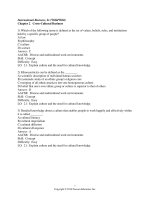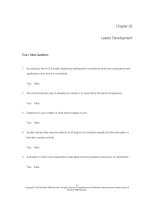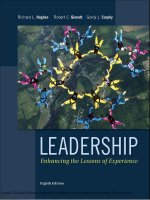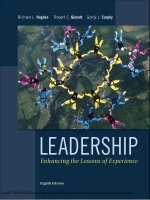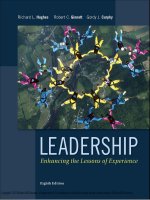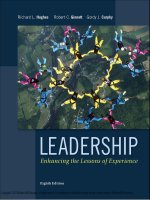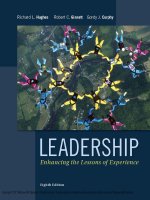Leadership enhancing the lessons of experience 8th edition hughes test bank
Bạn đang xem bản rút gọn của tài liệu. Xem và tải ngay bản đầy đủ của tài liệu tại đây (263.63 KB, 37 trang )
Chapter 02
Leader Development
True / False Questions
1.
According to the A-O-R model, leadership development is enhanced when the consequence and
significance of an action is considered.
True
2.
The most productive way to develop as a leader is to travel along the spiral of experience.
True
3.
False
Experience is just a matter of what events happen to you.
True
4.
False
False
Studies indicate that everyone attends to all aspects of a situation equally and that perception is
basically a passive activity.
True
5.
False
A situation in which one's expectations help determine the predicted outcome is an "attribution."
True
False
2-1
Copyright © 2015 McGraw-Hill Education. All rights reserved. No reproduction or distribution without the prior written consent of
McGraw-Hill Education.
6.
The tendency to overestimate the dispositional factors and underestimate the environmental
factors in someone else's failure is a fundamental attribution error.
True
7.
False
Single-loop learning refers to a self-fulfilling belief system, which is generally not open to
feedback.
True
8.
False
Double-loop learning is the process of learning something that one already predicted, as in the
"self-fulfilling prophecy."
True
9.
False
Studies show that after event reviews (AERs), which involve reflecting on personal leadership
experiences, fail to improve leadership effectiveness.
True
False
10. The times when people most need to break out of the mold created by past learning patterns tend
to be the times when they are most unwilling to do so.
True
False
11. Role-playing activities are used extensively during informal coaching sessions.
True
False
2-2
Copyright © 2015 McGraw-Hill Education. All rights reserved. No reproduction or distribution without the prior written consent of
McGraw-Hill Education.
12. A participant in an in-basket exercise has a limited amount of time to prioritize and respond to emails and phone messages from an actual manager's in-box.
True
False
13. Technology-based approaches to leader development, such as video games and simulations,
encourage participants to take risks and think quickly.
True
False
14. A drawback to action learning is that it requires spending time away from one's immediate job
responsibilities.
True
False
15. Insight on a leader's strengths and development needs can be gathered through 360-degree
feedback.
True
False
16. Leaders and followers use development plans as road maps for changing their own behaviors.
True
False
17. Leadership practitioners have a tendency to concentrate on coaching their top followers and
overlooking low-performing followers.
True
False
2-3
Copyright © 2015 McGraw-Hill Education. All rights reserved. No reproduction or distribution without the prior written consent of
McGraw-Hill Education.
18. Although formal coaching programs are considered effective tools for developing leaders, less
than half of the Global 1,000 companies use formal coaching because of high investment costs and
extensive time constraints.
True
False
19. Effective coaches require coachees to practice targeted behaviors through role-play activities and
later in real-world situations.
True
False
20. Mentoring and coaching are essentially the same types of programs.
True
False
Multiple Choice Questions
21. Leadership development is enhanced when experience involves the three processes of:
A. stopping, looking, and listening.
B. perception, attribution, and learning.
C. action, observation, and reflection.
D. action, behavior, and consequence.
2-4
Copyright © 2015 McGraw-Hill Education. All rights reserved. No reproduction or distribution without the prior written consent of
McGraw-Hill Education.
22. Which statement about perceptual sets is most likely FALSE?
A. Perceptual sets can influence any of our senses.
B. Perceptual sets are the tendency to perceive everything.
C. Feelings and needs can trigger a perceptual set.
D. Prior experiences can cause a perceptual set.
23. In perception, which term refers to the process of assigning underlying causes to behaviors?
A. Attribution
B. Single-loop learning
C. Self-fulfilling prophecy
D. Fundamental attribution error
24. Crediting your own successes to dispositional factors and others' successes to factors in the
environment are aspects of:
A. single-loop learning.
B. fundamental attribution error.
C. self-fulfilling prophecy.
D. double-loop learning.
2-5
Copyright © 2015 McGraw-Hill Education. All rights reserved. No reproduction or distribution without the prior written consent of
McGraw-Hill Education.
25. People who are observing an action are much more likely than the actor to make the fundamental
attribution error. This is called:
A. stereotyping.
B. self-serving bias.
C. ultimate attribution error.
D. actor/observer difference.
26. Which statement about the reflection component of the A-O-R model is most likely FALSE?
A. The importance of reflection in leadership development is rarely addressed by scholars.
B. Reflection is the most significant and most neglected component of the A-O-R model.
C. Reflection provides leaders with insight into how to frame problems differently.
D. Busy schedules typically prevent leaders from engaging in leadership reflection.
27. A situation in which one's expectations or predictions help determine the very results predicted is
referred to as:
A. attribution.
B. double-loop learning.
C. self-fulfilling prophecy.
D. fundamental attribution error.
2-6
Copyright © 2015 McGraw-Hill Education. All rights reserved. No reproduction or distribution without the prior written consent of
McGraw-Hill Education.
28. Which term refers to a kind of learning between the individual and the environment in which
learners seek relatively little feedback that may significantly confront their fundamental ideas or
actions?
A. Deutero-learning
B. Double-loop learning
C. Action learning
D. Single-loop learning
29. Which of the following involves confronting your beliefs, inviting others to challenge you, and
working on personal blind spots?
A. Fundamental attribution
B. Double-loop learning
C. Self-fulfilling prophecy
D. Single-loop learning
30. What is a frequent lesson learned by both men and women from their career experiences?
A. Recognizing and seizing opportunities
B. Understanding personal limits
C. Persevering through adversity
D. Handling political situations
2-7
Copyright © 2015 McGraw-Hill Education. All rights reserved. No reproduction or distribution without the prior written consent of
McGraw-Hill Education.
31. Leadership studies programs at the university-level:
A. typically offer academic credit in the form of academic minors.
B. are increasingly popular at many liberal-arts institutions.
C. are typically curriculum-based at public and private institutions.
D. should focus primarily on a single field of discipline, such as management.
32. _____ describe leadership situations and are used as vehicles for leadership discussions.
A. In-basket exercises
B. Simulations
C. Case studies
D. Games
33. What is most likely an advantage of role playing in leadership development programs?
A. Provides individualized feedback to students through leadership behavior ratings
B. Analyzes the challenges commonly faced in the work environment
C. Establishes a useful vehicle for leadership discussions
D. Provides greater transferability to the workplace
34. Leadership training programs for mid-level managers are LEAST likely to focus on improving _____
skills.
A. strategic planning
B. time management
C. oral communication
D. interpersonal
2-8
Copyright © 2015 McGraw-Hill Education. All rights reserved. No reproduction or distribution without the prior written consent of
McGraw-Hill Education.
35. Which of the following involves participants being given a limited amount of time to prioritize and
respond to a number of notes, phone messages, and letters?
A. Virtual simulations
B. Role playing
C. In-basket exercises
D. Case studies
36. In leaderless group discussions, facilitators and observers rate participants and provide feedback
about _____ skills.
A. supervisory
B. interpersonal
C. planning
D. time management
37. Which statement about action learning is most likely FALSE?
A. Adults learn best by doing, which is the basic philosophy of action learning.
B. Although action learning is a popular tool, it has not shown a high level of effectiveness in
leadership development.
C. Action learning often involves assignment to a work team that addresses real-time actual
challenges the company is facing.
D. Action learning involves attending classes, watching videotapes, and working in teams to create
development plans for the firm.
2-9
Copyright © 2015 McGraw-Hill Education. All rights reserved. No reproduction or distribution without the prior written consent of
McGraw-Hill Education.
38. In the informal coaching process, a leader is most likely to help a follower to grow skills by:
A. reviewing a 360-degree feedback.
B. creating a coaching plan.
C. identifying long-term career goals.
D. conducting a personality assessment.
39. In the informal coaching process, a leader is most likely to inspire commitment from a follower by
_____.
A. reviewing performance appraisals
B. building a trusting relationship
C. assisting with networking
D. providing new tasks
40. The process by which an older and more experienced person helps to socialize and encourage
younger organizational colleagues is called:
A. evaluating.
B. consulting.
C. mentoring.
D. networking.
Essay Questions
2-10
Copyright © 2015 McGraw-Hill Education. All rights reserved. No reproduction or distribution without the prior written consent of
McGraw-Hill Education.
41. Discuss leadership development in terms of the action-observation-reflection model.
42. Explain the role of perceptions in each aspect of the spiral of experience: observation, reflection,
and action. Provide examples to illustrate your response.
43. Differentiate between single-loop learning and double-loop learning. Which one is more difficult in
terms of leadership development? Why?
2-11
Copyright © 2015 McGraw-Hill Education. All rights reserved. No reproduction or distribution without the prior written consent of
McGraw-Hill Education.
44. Explain how going against the grain is often an important ingredient in learning from experience.
45. Explain how techniques such as role playing, in-basket exercises, and leaderless group discussions
enhance leadership training.
46. Discuss the components and effectiveness of action learning.
2-12
Copyright © 2015 McGraw-Hill Education. All rights reserved. No reproduction or distribution without the prior written consent of
McGraw-Hill Education.
47. Describe the arts-based approach to leader development.
48. What is the purpose of development planning? What are the components of an effective
development plan?
49. Describe the five steps of informal coaching.
2-13
Copyright © 2015 McGraw-Hill Education. All rights reserved. No reproduction or distribution without the prior written consent of
McGraw-Hill Education.
50. Explain how mentoring differs from coaching.
2-14
Copyright © 2015 McGraw-Hill Education. All rights reserved. No reproduction or distribution without the prior written consent of
McGraw-Hill Education.
Chapter 02 Leader Development Answer Key
True / False Questions
1.
According to the A-O-R model, leadership development is enhanced when the consequence
(p. 45)
and significance of an action is considered.
TRUE
Difficulty: 2 Medium
Type: Knowledge
2.
The most productive way to develop as a leader is to travel along the spiral of experience.
(p. 45)
TRUE
Difficulty: 1 Easy
Type: Knowledge
3.
Experience is just a matter of what events happen to you.
(p. 47)
FALSE
Difficulty: 1 Easy
Type: Knowledge
2-15
Copyright © 2015 McGraw-Hill Education. All rights reserved. No reproduction or distribution without the prior written consent of
McGraw-Hill Education.
4.
Studies indicate that everyone attends to all aspects of a situation equally and that perception is
(p. 47- basically a passive activity.
48)
FALSE
Difficulty: 2 Medium
Type: Knowledge
5.
A situation in which one's expectations help determine the predicted outcome is an
(p. 49)
"attribution."
FALSE
Difficulty: 1 Easy
Type: Vocabulary
6.
The tendency to overestimate the dispositional factors and underestimate the environmental
(p. 50)
factors in someone else's failure is a fundamental attribution error.
TRUE
Difficulty: 1 Easy
Type: Vocabulary
7.
Single-loop learning refers to a self-fulfilling belief system, which is generally not open to
(p. 54)
feedback.
TRUE
Difficulty: 1 Easy
Type: Knowledge
2-16
Copyright © 2015 McGraw-Hill Education. All rights reserved. No reproduction or distribution without the prior written consent of
McGraw-Hill Education.
8.
Double-loop learning is the process of learning something that one already predicted, as in the
(p. 54)
"self-fulfilling prophecy."
FALSE
Difficulty: 1 Easy
Type: Knowledge
9.
Studies show that after event reviews (AERs), which involve reflecting on personal leadership
(p. 55)
experiences, fail to improve leadership effectiveness.
FALSE
Difficulty: 1 Easy
Type: Knowledge
10.
The times when people most need to break out of the mold created by past learning patterns
(p. 57)
tend to be the times when they are most unwilling to do so.
TRUE
Difficulty: 1 Easy
Type: Knowledge
11.
Role-playing activities are used extensively during informal coaching sessions.
(p. 61)
FALSE
Difficulty: 2 Medium
Type: Knowledge
2-17
Copyright © 2015 McGraw-Hill Education. All rights reserved. No reproduction or distribution without the prior written consent of
McGraw-Hill Education.
12.
A participant in an in-basket exercise has a limited amount of time to prioritize and respond to
(p. 61)
e-mails and phone messages from an actual manager's in-box.
FALSE
Difficulty: 1 Easy
Type: Knowledge
13.
Technology-based approaches to leader development, such as video games and simulations,
(p. 64)
encourage participants to take risks and think quickly.
TRUE
Difficulty: 1 Easy
Type: Knowledge
14.
A drawback to action learning is that it requires spending time away from one's immediate job
(p. 65)
responsibilities.
FALSE
Difficulty: 1 Easy
Type: Knowledge
15.
Insight on a leader's strengths and development needs can be gathered through 360-degree
(p. 66)
feedback.
TRUE
Difficulty: 1 Easy
Type: Knowledge
2-18
Copyright © 2015 McGraw-Hill Education. All rights reserved. No reproduction or distribution without the prior written consent of
McGraw-Hill Education.
16.
Leaders and followers use development plans as road maps for changing their own behaviors.
(p. 68)
TRUE
Difficulty: 2 Medium
Type: Knowledge
17.
Leadership practitioners have a tendency to concentrate on coaching their top followers and
(p. 69)
overlooking low-performing followers.
FALSE
Difficulty: 2 Medium
Type: Knowledge
18.
Although formal coaching programs are considered effective tools for developing leaders, less
(p. 70-
than half of the Global 1,000 companies use formal coaching because of high investment costs
71)
and extensive time constraints.
FALSE
Difficulty: 2 Medium
Type: Knowledge
19.
Effective coaches require coachees to practice targeted behaviors through role-play activities
(p. 72)
and later in real-world situations.
TRUE
Difficulty: 1 Easy
Type: Knowledge
2-19
Copyright © 2015 McGraw-Hill Education. All rights reserved. No reproduction or distribution without the prior written consent of
McGraw-Hill Education.
20.
Mentoring and coaching are essentially the same types of programs.
(p. 72)
FALSE
Difficulty: 1 Easy
Type: Knowledge
Multiple Choice Questions
21.
Leadership development is enhanced when experience involves the three processes of:
(p. 45)
A. stopping, looking, and listening.
B. perception, attribution, and learning.
C. action, observation, and reflection.
D. action, behavior, and consequence.
Difficulty: 1 Easy
Type: Knowledge
22.
Which statement about perceptual sets is most likely FALSE?
(p. 48)
A. Perceptual sets can influence any of our senses.
B. Perceptual sets are the tendency to perceive everything.
C. Feelings and needs can trigger a perceptual set.
D. Prior experiences can cause a perceptual set.
Difficulty: 2 Medium
Type: Knowledge
2-20
Copyright © 2015 McGraw-Hill Education. All rights reserved. No reproduction or distribution without the prior written consent of
McGraw-Hill Education.
23.
In perception, which term refers to the process of assigning underlying causes to behaviors?
(p. 49)
A. Attribution
B. Single-loop learning
C. Self-fulfilling prophecy
D. Fundamental attribution error
Difficulty: 1 Easy
Type: Vocabulary
24.
Crediting your own successes to dispositional factors and others' successes to factors in the
(p. 50)
environment are aspects of:
A. single-loop learning.
B. fundamental attribution error.
C. self-fulfilling prophecy.
D. double-loop learning.
Difficulty: 2 Medium
Type: Vocabulary
25.
People who are observing an action are much more likely than the actor to make the
(p. 50)
fundamental attribution error. This is called:
A. stereotyping.
B. self-serving bias.
C. ultimate attribution error.
D. actor/observer difference.
Difficulty: 1 Easy
Type: Vocabulary
2-21
Copyright © 2015 McGraw-Hill Education. All rights reserved. No reproduction or distribution without the prior written consent of
McGraw-Hill Education.
26.
Which statement about the reflection component of the A-O-R model is most likely FALSE?
(p. 52)
A. The importance of reflection in leadership development is rarely addressed by scholars.
B. Reflection is the most significant and most neglected component of the A-O-R model.
C. Reflection provides leaders with insight into how to frame problems differently.
D. Busy schedules typically prevent leaders from engaging in leadership reflection.
Difficulty: 3 Hard
Type: Knowledge
27.
A situation in which one's expectations or predictions help determine the very results predicted
(p. 53)
is referred to as:
A. attribution.
B. double-loop learning.
C. self-fulfilling prophecy.
D. fundamental attribution error.
Difficulty: 1 Easy
Type: Vocabulary
2-22
Copyright © 2015 McGraw-Hill Education. All rights reserved. No reproduction or distribution without the prior written consent of
McGraw-Hill Education.
28.
Which term refers to a kind of learning between the individual and the environment in which
(p. 54)
learners seek relatively little feedback that may significantly confront their fundamental ideas or
actions?
A. Deutero-learning
B. Double-loop learning
C. Action learning
D. Single-loop learning
Difficulty: 2 Medium
Type: Vocabulary
29.
Which of the following involves confronting your beliefs, inviting others to challenge you, and
(p. 54)
working on personal blind spots?
A. Fundamental attribution
B. Double-loop learning
C. Self-fulfilling prophecy
D. Single-loop learning
Difficulty: 1 Easy
Type: Vocabulary
30.
What is a frequent lesson learned by both men and women from their career experiences?
(p. 56)
A. Recognizing and seizing opportunities
B. Understanding personal limits
C. Persevering through adversity
D. Handling political situations
Difficulty: 2 Medium
2-23
Copyright © 2015 McGraw-Hill Education. All rights reserved. No reproduction or distribution without the prior written consent of
McGraw-Hill Education.
Type: Knowledge
31.
Leadership studies programs at the university-level:
(p. 58)
A. typically offer academic credit in the form of academic minors.
B. are increasingly popular at many liberal-arts institutions.
C. are typically curriculum-based at public and private institutions.
D. should focus primarily on a single field of discipline, such as management.
Difficulty: 2 Medium
Type: Knowledge
32.
_____ describe leadership situations and are used as vehicles for leadership discussions.
(p. 60)
A. In-basket exercises
B. Simulations
C. Case studies
D. Games
Difficulty: 1 Easy
Type: Vocabulary
33.
What is most likely an advantage of role playing in leadership development programs?
(p. 60)
A. Provides individualized feedback to students through leadership behavior ratings
B. Analyzes the challenges commonly faced in the work environment
C. Establishes a useful vehicle for leadership discussions
D. Provides greater transferability to the workplace
Difficulty: 3 Hard
Type: Knowledge
2-24
Copyright © 2015 McGraw-Hill Education. All rights reserved. No reproduction or distribution without the prior written consent of
McGraw-Hill Education.
34.
Leadership training programs for mid-level managers are LEAST likely to focus on improving
(p. 61)
_____ skills.
A. strategic planning
B. time management
C. oral communication
D. interpersonal
Difficulty: 2 Medium
Type: Knowledge
35.
Which of the following involves participants being given a limited amount of time to prioritize
(p. 61)
and respond to a number of notes, phone messages, and letters?
A. Virtual simulations
B. Role playing
C. In-basket exercises
D. Case studies
Difficulty: 1 Easy
Type: Knowledge
2-25
Copyright © 2015 McGraw-Hill Education. All rights reserved. No reproduction or distribution without the prior written consent of
McGraw-Hill Education.
